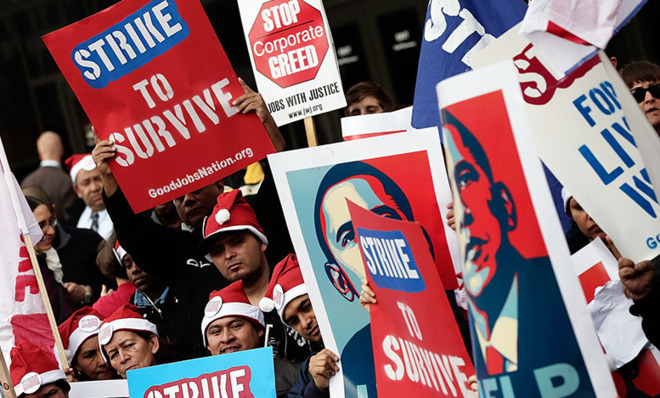America's broken promise
Hard work and dedication to your job used to ensure substantial raises and upward mobility. That's no longer true.


A free daily email with the biggest news stories of the day – and the best features from TheWeek.com
You are now subscribed
Your newsletter sign-up was successful
Dude, where is my raise? If you had to summarize why voters rebelled against Democrats in last week's midterms, that question would be it. In national exit polls, the economy by far ranked first on the list of voter concerns, even though by Wall Street standards, the economy is hunky-dory: Unemployment is dropping, and corporate profits and the stock market are in the stratosphere. But here's the rub: All that lovely wealth isn't trickling down. The country's median income hit a high of $56,080 in 1999, went into slow decline, dropped to $53,644 after the 2008 economic meltdown — and five years later, was lower still, at $52,100. Raises remain tiny. Many newly created jobs pay a pittance. For tens of millions of people, the economic recovery is an illusion.
The voters are right: Wage stagnation — and the resulting erosion of the middle class — is this country's biggest problem. When hard work no longer produces upward mobility for workers who lack elite skills, America's implicit promise is broken. At National Review, conservative Maggie Gallagher complains that "for more than a decade Americans have been losing ground financially, and the GOP has yet to address the issue." In The Washington Post, liberal Harold Meyerson grouses that "the Democrats have had precious little to say about how to re-create…widely shared prosperity." Perhaps that's because the standard liberal and conservative nostrums (Tax the rich! Eliminate regulations!) won't address the fundamental problem: Globalization and technology have devalued both labor and workers, and made companies more ruthlessly competitive. Here's a scary thought: Neither party is offering a remedy because there isn't one.
A free daily email with the biggest news stories of the day – and the best features from TheWeek.com
The Week
Escape your echo chamber. Get the facts behind the news, plus analysis from multiple perspectives.

Sign up for The Week's Free Newsletters
From our morning news briefing to a weekly Good News Newsletter, get the best of The Week delivered directly to your inbox.
From our morning news briefing to a weekly Good News Newsletter, get the best of The Week delivered directly to your inbox.
William Falk is editor-in-chief of The Week, and has held that role since the magazine's first issue in 2001. He has previously been a reporter, columnist, and editor at the Gannett Westchester Newspapers and at Newsday, where he was part of two reporting teams that won Pulitzer Prizes.
-
 Film reviews: ‘Send Help’ and ‘Private Life’
Film reviews: ‘Send Help’ and ‘Private Life’Feature An office doormat is stranded alone with her awful boss and a frazzled therapist turns amateur murder investigator
-
 Movies to watch in February
Movies to watch in Februarythe week recommends Time travelers, multiverse hoppers and an Iraqi parable highlight this month’s offerings during the depths of winter
-
 ICE’s facial scanning is the tip of the surveillance iceberg
ICE’s facial scanning is the tip of the surveillance icebergIN THE SPOTLIGHT Federal troops are increasingly turning to high-tech tracking tools that push the boundaries of personal privacy
